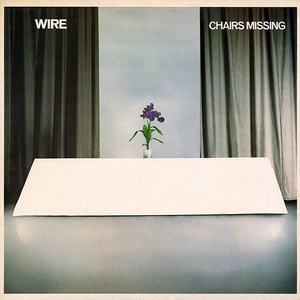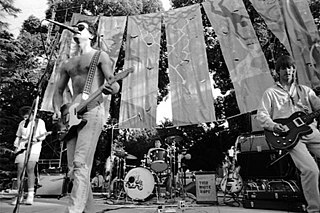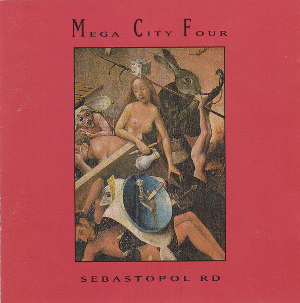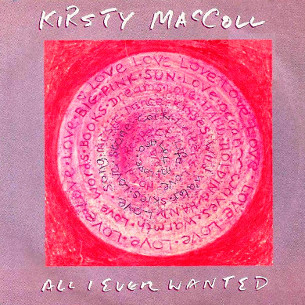
Fear of Music is the third studio album by American rock band Talking Heads, released on August 3, 1979, by Sire Records. It was recorded at locations in New York City during April and May 1979 and was produced by Brian Eno and Talking Heads. The album reached number 21 on the Billboard 200 and number 33 on the UK Albums Chart. It spawned the singles "Life During Wartime", "I Zimbra", and "Cities".

Pod is the debut studio album by American alternative rock band the Breeders, released by 4AD records on May 29, 1990. Engineered by Steve Albini, the album features band leader Kim Deal on vocals and guitar, Josephine Wiggs on bass, Britt Walford on drums, and Tanya Donelly on guitar. Albini's production prioritized sound over technical accomplishment; the final takes favor the band's spontaneous live "in studio" performances.

Pink Flag is the debut studio album by English rock band Wire. It was released in November 1977 by Harvest Records. The album gained Wire a cult following within independent and post-punk music upon its initial release, later growing to be highly influential on many other musicians.

A Bell Is a Cup... Until It Is Struck is the fifth studio album by the British post-punk group Wire.

All Mod Cons is the third studio album by the British band the Jam, released in 1978 by Polydor Records. The title, a British idiom one might find in housing advertisements, is short for "all modern conveniences" and is a pun on the band's association with the mod revival. The cover is a visual joke showing the band in a bare room. The album reached No. 6 in the UK Albums Chart.

Slates is an EP by the Fall, released on 27 April 1981 by Rough Trade Records. It was one of singer Mark E. Smith's favourite Fall releases, and he claimed it was aimed at "people who didn't buy records".

Chairs Missing is the second studio album by English rock band Wire. It was released on 8 September 1978 by Harvest Records. The album peaked at number 48 in the UK Albums Chart.

Grotesque (After the Gramme) is the third studio album by English band the Fall. Released on 17 November 1980, it was the band's first studio album on Rough Trade.

Perverted by Language is the sixth studio album by English post-punk group The Fall, released in December 1983 on Rough Trade Records.

Strip-mine is the second studio album by English rock band James. It was released on 26 September 1988, through Sire and Blanco y Negro Records. After minimal touring and lack of success for their debut studio album Stutter (1986), the label was apprehensive about letting them record another album. Sessions for it were held in early 1987 at Rockfield Studios with Hugh Jones producing the majority of the album, except for "Are You Ready", which produced by Steve Power and Steve Lovell. After the recording, the release was delayed a number of times, until it was eventually remixed early the following year at London's Battery Studios. Described as a folk-pop album, the songs on Strip-mine tackled the topics of misinformation, addiction, and human mortality.
Rip Rig + Panic was an English post-punk band founded in 1980 and disbanded in 1983. The band was named after the 1965 jazz album of the same name by Roland Kirk. It was formed by Sean Oliver (bass), Mark Springer, Gareth Sager and Bruce Smith — the latter two formerly of The Pop Group) — with singer Neneh Cherry. Other members included saxophonist Flash, singer Andi Oliver, trumpeter David De Fries, and viola-player Sarah Sarhandi.

Thin White Rope was an American rock band associated with the desert rock and Paisley Underground subgenres, fronted by vocalist Guy Kyser. The band released five albums.

The Drill is the eighth studio album by the British post-punk group Wire, released in April 1991 by Mute Records. The album comprises rerecorded and remixed versions of the same song, "Drill", with some versions featuring new lyrics. It is officially listed as an EP rather than an album despite its length of almost one hour.

Sebastopol Rd. is an album by the English band Mega City Four, released in 1992. It was the band's only album to be released in the United States; they supported it with a North American tour. The album was reissued in 2013 with a Peel session, among other bonus tracks.

"Free World" is a song by British singer and songwriter Kirsty MacColl, which was released in 1989 as the lead single from her second studio album Kite. It was written by MacColl and produced by Steve Lillywhite. "Free World" reached number 43 in the UK Singles Chart and remained in the top 100 for seven weeks.

"All I Ever Wanted" is a song by British singer-songwriter Kirsty MacColl, which was released in 1991 as the third and final single from her third studio album Electric Landlady. It was written by MacColl and Marshall Crenshaw, and produced by Steve Lillywhite.

Wire Train is the fourth album by the American band Wire Train, released in 1990. David Fincher directed the video for "Should She Cry?" Wire Train supported the album by touring with Bob Dylan.

This Time Around is an album by the American band Green on Red, released in 1989. It was first released in the United Kingdom. The band supported the album with a European tour. This Time Around was a commercial disappointment.

The Silos is an album by the American band the Silos, released in 1990. A commercial disappointment, it was the band's only album for RCA Records. The Silos peaked at No. 141 on the Billboard 200. The band supported the album with a North American tour that included shows with the Jayhawks.


















